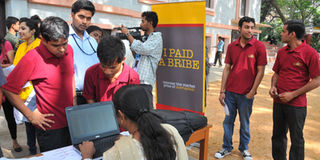Bringing corruption to light

Making use of ICT to tackle an endemic social problem. COURTESY PHOTO
In India, where petty corruption is endemic, the website ipaidabribe.com invites citizens to share their stories of bribery, believing that awareness and transparency can help to transform the system.
“Yesterday I paid Rs 100 to a police constable for passport verification.”
“I paid [a] bribe to collect death certificate, no freedom in corruption even in death.” “Harassment was only stopped when the amount was paid.”
Tales by the victims of petty corruption fill page after page on the Indian website ipaidabribe.com. According to Transparency International, 54 per cent of Indian citizens say they paid a bribe in 2010, the same year the site went live. I Paid a Bribe refers to the phenomenon as “retail corruption,” where the government machinery does not work until you grease an officer’s palms.
I Paid a Bribe was founded by a couple, Swati and Ramesh Ramanathan, who left careers in the United States to return to India and establish a non-profit organisation, Janaagraha. Based out of India’s Silicon Valley, Bangalore, I Paid a Bribe is first and foremost a reporting mechanism. Its goal is to raise general awareness of the issue and improve government systems by sharing crowd sourced reports with the media and officials. Claims are made anonymously and no names are published, to avoid libel or defamation.
“Retail corruption, in my view, corrupts the value system of the entire society,” Swati Ramanathan said. “It is very easy for everyone to go and protest in a maidan (public square) against a corrupt regime or government, and later come back home and not even blink when a cop or a government official demands a bribe.”
I Paid a Bribe claims to have received more than 4.5 million page views since its inception, and publicises more than 27,000 stories of how people across the country have been coerced into coughing up money. Collectively, these victims report having paid about $35 million (about Shs90b) in bribes to corrupt officers.
The website offers information on how people can avoid paying bribes, and includes a section where people share their stories of not budging. It also encourages people to write about honest officers they come across, to encourage such behavior. “Knowing that such information is available, and that these are the steps to go through to, say, get a property registered, empowers citizens and gives them the courage to resist paying bribes,” Swati Ramanathan said.
Ipaidabribe.com’s followers include government agencies who track the cases and sometimes even crack the whip on greedy officers. Bangalore-based engineer Manik Taneja’s post about how a customs officer browbeat him into paying a bribe resulted in the latter’s suspension. In 2012, Taneja purchased a kayak on a visit to the United States, and calculated that he would be required to pay no more than $150 (Shs390,000) in import tax.
However, the customs official at the airport demanded almost three times that amount, then threatened to impound the boat if Taneja did not pay him a bribe. Exhausted after a 20-hour flight, Taneja relented and paid.
The next day, he double-checked the rules and learned that he had correctly calculated the exemption. Stung, he vented his anger on ipaidabribe.com. Soon after he received a call from the customs department, requesting him to lodge a complaint. The officer concerned was suspended.
Joylita Saldanha, who works on the website, said the transport commissioner for the state of Karnataka (where Bangalore is located) was embarrassed to learn that his department had the city’s highest incidence of bribe-seeking. So he collaborated with the team from I Paid a Bribe to plug any loopholes.
They found that driving tests, for example, were highly problematic, since determining whether or not an applicant could drive well enough for license was a subjective decision, and officers often asked for money to boost a person’s score. In response, the motor vehicle department introduced automated driving test tracks with computer monitors.
The impact of I Paid a Bribe has attracted global attention. Various countries and NGOs have approached Janaagraha, asking to replicate the website’s source code. A dozen countries are now using it, including Pakistan, Greece, Hungary, and Kenya.
“Like they say, sunlight is the best disinfectant,” Swati Ramanathan remarked. “As more and more people start sharing their experiences with corruption on a public platform, it is bound to discourage people from indulging in it, owing to the greater chance of getting caught. I think in 20 years, retail corruption can be eradicated, and certainly from our end we will do everything possible to ensure that.”




